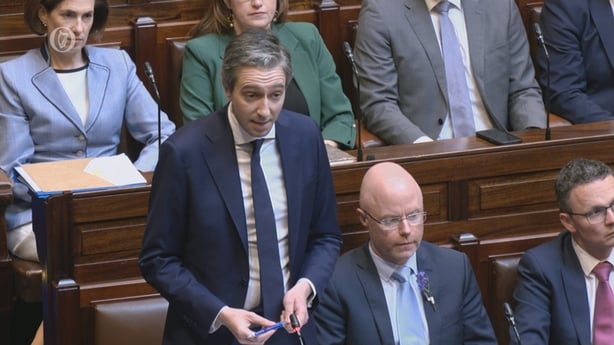Video-sharing platform TikTok has said it is looking into claims made by RTÉ's Prime Time regarding harmful content as a "matter of urgency".
The programme will air a report tonight about young users being exposed to videos relating to self-harm and suicide.
Representatives from TikTok are appearing before the Oireachtas Committee on Children alongside representatives from Meta and X.
Fianna Fáil Senator Malcolm Byrne asked TikTok about the Prime Time report.
In response, Head of Public Policy and Government Relations at Tik Tok Susan Moss said she had not seen the full report but is aware of it.
"I want to assure every member of this Committee, and indeed as we assured Coimisiún na Meán this morning, that we're looking into it as a matter of urgency," Ms Moss said.
"One negative experience is one experience to too many and so certainly we're going back, we're looking at it and we're taking action," she added.
Ms Moss said that the way in which Prime Time carried out its test is not representative of how an individual normally experiences TikTok.
"But I just do want to stress that we are committed to continuously looking at this area and how we can improve you know how we can strengthen our processes, particularly for younger users," she said.
Call for age verification across Europe
In its opening statement to the committee, Meta called for age verification to be implemented across Europe at an Oireachtas committee hearing today.
The social media company said it believes that a "significant step forward can be taken at European level to ensure that parents only need to verify the age of their child once".
Meta has suggested that the most effective way for this to work would be to implement a verification process at an operating system or app store level.
Meta's head of public policy Dualta Ó Broin said that the "time has come to move forward with an effective solution that addresses the concerns of all stakeholders including parents".
The social media companies were invited to appear before TDs and senators to discuss the protection of children in the use of Artificial Intelligence (AI).
According to Meta, AI systems are being used to remove material deemed to fall under the categories of bullying and harassment on Facebook.
However, Meta said that "one of the reasons that AI is not as effective in this harm area yet is that bullying and harassment can be quite contextual - and not as immediately apparent as a fake account".
Separately, in its opening statement TikTok said that AI along with "human oversight and judgement" is being used to "spot and stop threats".
In relation to content creation, it said that its policy "requires people to label AI-generated content that contains realistic images, audio or video".
Independent Senator Tom Clonan asked X about the large volume of anonymous accounts on its platform and said that negative posts often come from such users.
Claire Dile, Director of Government Affairs, Europe, X said there is no such thing as anonymity on the platform, but that people can use pseudonyms.
"Even if you are using a pseudonym on X, we can still give information to law enforcement to identify an offender," Ms Dile said.
Fine Gael Senator Mary Seery-Kearney asked if social media should come with a mental health warning for young people.
Child Safety Public Policy Lead at Tik Tok Chloe Setter said it has introduced screen time limits and take a break reminders for teens.
The platforms also spoke about the removal of content related to suicide and self-harm.
Fianna Fáil TD Jennifer Murnane O'Connor echoed recent comments made by the Tánaiste Micheál Martin and described social media as the public health crisis of our time.
Social media firms 'need to get real' on content - Harris

Earlier, Taoiseach Simon Harris told the Dáil that social media companies "need to get real" about the impact harmful content has on the mental health of young people.
"And if they don't, we need to be ready to act," he added.
The comments come ahead of an RTÉ Prime Time programme which examines concerns published by researchers and advocacy groups about young teens' mental health being negatively influenced by content on TikTok.
Mr Harris said that he will watch the programme "very closely this evening".
While he has not seen it yet - noting that "none of us has" - what he has read about the programme is "deeply harrowing".
"And we will need a response," Mr Harris said, adding that he will come back to the house on the matter.
The Taoiseach said that he shares the concerns Mr Martin expressed at the weekend about the impact of social media on the health of young people.
He will be "asking all relevant ministers to bring forward an up-to-date position on what more we can do in this space".
He was responding to Labour Party leader Ivana Bacik who asked how the Government is going to regulate social media companies in this regard.






